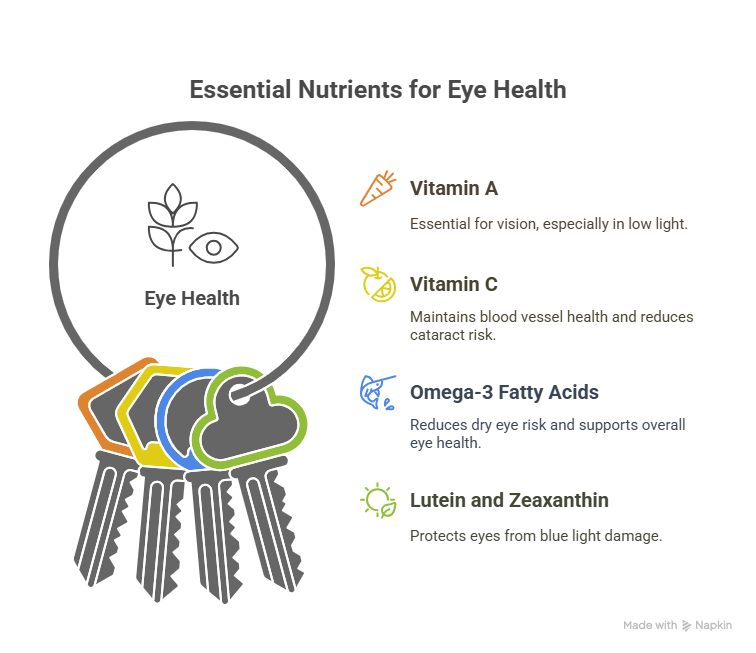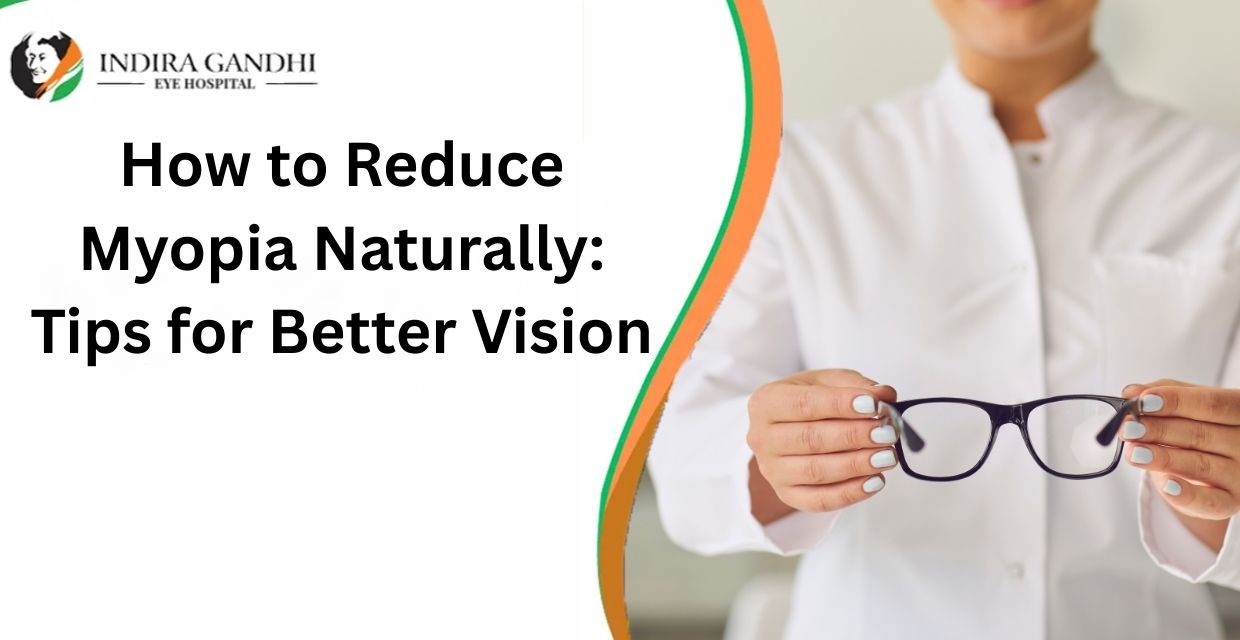|
Getting your Trinity Audio player ready...
|
Myopia, also known as nearsightedness, is a common refractive error that affects millions of people worldwide. If you suffer from myopia, it means you can see nearby objects clearly, but objects at a distance appear blurry. While glasses, contact lenses, and refractive surgery like LASIK are common treatments for myopia, many individuals wonder, how to reduce myopia naturally?
The good news is that there are several lifestyle changes, habits, and exercises you can incorporate into your daily routine to support eye health and possibly reduce myopia progression. While these methods might not completely reverse myopia, they can help maintain eye health and potentially slow down the worsening of the condition. In this blog, we’ll explore natural ways to support your vision, and how to reduce myopia naturally.
At Indira Gandhi Eye Hospital & Research Centre (IGEHRC), we are committed to providing comprehensive eye care and guidance on improving eye health. If you’re seeking more personalized advice, you can always reach out to our team at the eye hospital Gurgaon for professional recommendations tailored to your specific needs.
What is Myopia?

Before we dive into the tips for reducing myopia naturally, it’s important to understand what myopia is and how it affects vision.
Myopia occurs when the eye grows too long from front to back, or when the cornea (the clear front surface of the eye) is too curved. As a result, light entering the eye doesn’t focus directly on the retina at the back of the eye, but instead focuses in front of it, leading to blurred distance vision.
Typically, myopia worsens during childhood and adolescence, often stabilizing in early adulthood. However, some individuals experience progression into adulthood, especially those who engage in activities that demand close-up vision (e.g., reading, working on a computer, or using smartphones).
While genetic factors can play a role in the development of myopia, certain environmental and lifestyle factors can influence its progression. Now let’s take a look at natural ways you can support your vision.
How to Reduce Myopia Naturally
1. Spend More Time Outdoors
One of the simplest yet most effective ways to help reduce myopia naturally is to spend more time outdoors. Studies have shown that children who spend more time outdoors are less likely to develop or experience the worsening of myopia. This is partly due to exposure to natural light and the act of focusing on distant objects, which is crucial for eye health.
Getting outdoors for just 2 hours a day can help prevent the progression of myopia. Natural light exposure is beneficial because it stimulates the production of dopamine, a neurotransmitter that helps regulate the growth of the eye. If your child or you spend long hours indoors focusing on close-up tasks, it may encourage the eye to grow longer, exacerbating myopia.
2. Take Regular Breaks from Screens (The 20-20-20 Rule)
In today’s digital age, we spend a significant amount of time looking at screens—whether it’s a smartphone, tablet, computer, or television. Prolonged screen time is one of the leading causes of eye strain and myopia progression. To reduce myopia naturally, it’s essential to give your eyes regular breaks.
A good rule of thumb is the 20-20-20 rule: Every 20 minutes, look at something 20 feet away for at least 20 seconds. This gives your eyes a break from focusing on near objects and helps relax the eye muscles. If you work in front of a screen for long hours, be sure to incorporate this rule to reduce strain and support better eye health.
3. Practice Eye Exercises
Just like any other muscle in the body, your eyes need exercise to stay healthy. Regular eye exercises can help reduce the risk of myopia progression and even improve focus and clarity. Here are a few simple exercises that may help:
- Palming: Rub your hands together to generate warmth, then gently cup your palms over your closed eyes without pressing. Relax and breathe deeply for a minute or two. This helps relieve eye strain and relaxes the muscles around the eyes.
- Focus Shifting: Hold your thumb about 10 inches in front of your face. Focus on it for a few seconds, then shift your gaze to something further away (about 20 feet) and focus on that for a few seconds. Repeat this exercise several times to train your eye muscles to adjust focus naturally.
- Figure Eight: Imagine a large figure eight about 10 feet in front of you. Slowly trace the figure eight with your eyes, moving your eyes up, down, left, and right. This exercise helps improve your eye’s flexibility and focus ability.
These exercises, when done consistently, may help maintain and improve focus, which is particularly beneficial for people who spend long hours working at close distances.
4. Maintain a Healthy Diet for Eye Health

Eating a balanced diet rich in nutrients can significantly impact eye health. Certain vitamins and minerals play a critical role in preventing eye diseases and improving vision. Here are some key nutrients to focus on:
- Vitamin A: Essential for good vision, particularly in low-light conditions. It is found in foods like carrots, sweet potatoes, spinach, and kale.
- Vitamin C: Helps maintain the health of blood vessels in the eyes and may reduce the risk of cataracts. Citrus fruits, bell peppers, and broccoli are excellent sources of vitamin C.
- Omega-3 Fatty Acids: Important for eye health and can help reduce the risk of eye conditions like dry eyes. Foods like salmon, flaxseeds, and walnuts are rich in omega-3s.
- Lutein and Zeaxanthin: These antioxidants are found in high concentrations in the retina and may protect the eyes from damage caused by blue light. Green leafy vegetables like spinach, kale, and broccoli are rich in lutein and zeaxanthin.
Consuming a variety of these eye-healthy foods can help support your overall eye health and may slow down the progression of myopia.
5. Proper Posture and Lighting
Maintaining good posture and lighting while reading, studying, or working can also have an impact on reducing myopia naturally. Poor posture or dim lighting can strain the eyes, leading to worsening myopia. Here are a few tips:
- Sit up straight: When reading or using a device, sit with your back straight and the screen or book positioned at eye level. Avoid slouching or leaning forward.
- Use adequate lighting: Ensure that your workspace is well-lit, but avoid harsh lighting that causes glare. The light should come from behind you or from the side, illuminating your work without straining your eyes.
- Keep a proper reading distance: Hold books, devices, or screens at least 12-18 inches away from your eyes to avoid excessive strain.
6. Sleep Well
Sleep plays a vital role in maintaining healthy vision. A good night’s sleep helps your eyes recover from the day’s strain. During sleep, your body replenishes important nutrients and repairs tissues, including those in your eyes. Lack of sleep can lead to eye fatigue and increased risk of developing or worsening myopia.
Ensure you get 7-9 hours of quality sleep each night. If you suffer from sleep disorders or find it difficult to fall asleep, consider establishing a relaxing bedtime routine or seeking advice from a healthcare professional.
When to Seek Professional Help
While natural remedies can help improve eye health and potentially reduce myopia progression, they are not a substitute for professional eye care. If you experience any changes in your vision or have concerns about your myopia, it’s important to consult with an eye care specialist.
At the eye hospital Gurgaon, our team of skilled ophthalmologists is here to provide expert guidance and treatment options. We offer comprehensive eye care, including myopia management, and can help you develop a personalized plan to protect and improve your vision.
Conclusion
Reducing myopia naturally involves a combination of healthy habits, regular eye exercises, a nutritious diet, and proper eye care. While you may not completely reverse myopia, these steps can help support eye health and potentially slow its progression. If you’re concerned about your myopia or need professional guidance, don’t hesitate to reach out to a trusted eye hospital Gurgaon. At Indira Gandhi Eye Hospital & Research Centre, we are here to help you achieve and maintain better vision for a lifetime.
By making small changes to your daily routine and prioritizing eye health, you can take steps toward reducing myopia naturally and improving your overall quality of life.
Can you reverse myopia naturally?
Myopia (nearsightedness) cannot be fully reversed naturally, but certain lifestyle changes can help slow its progression. Spending more time outdoors, reducing screen time, practicing good visual habits, and doing eye exercises may help in managing symptoms, especially in children. However, these methods do not permanently correct the underlying refractive error.
Is 2.5 eyesight can be improved?
A -2.5 prescription indicates moderate myopia. While it cannot be “cured” naturally, it can be corrected effectively with glasses, contact lenses, or vision correction procedures like LASIK. Some treatments like orthokeratology (Ortho-K) lenses may help temporarily reshape the cornea, but permanent improvement generally requires medical intervention.
How can I fix myopia without glasses?
To manage myopia without glasses, options include contact lenses, orthokeratology (Ortho-K), and refractive surgeries such as LASIK or SMILE. While some eye exercises and lifestyle changes may help reduce eye strain or slow progression, they do not permanently fix myopia.
At what age does myopia stop getting worse?
Myopia usually stabilizes in early adulthood, typically between the ages of 20 and 25. However, in some cases, it may continue to worsen slightly beyond this age, especially with excessive screen time or poor visual habits.
Can myopia go away with age?
Myopia does not usually go away with age. However, as people reach their 40s or older, they may develop presbyopia (difficulty seeing close objects), which can sometimes make them less dependent on glasses for near work. This does not mean the myopia is cured—it’s simply a shift in overall vision due to aging.












